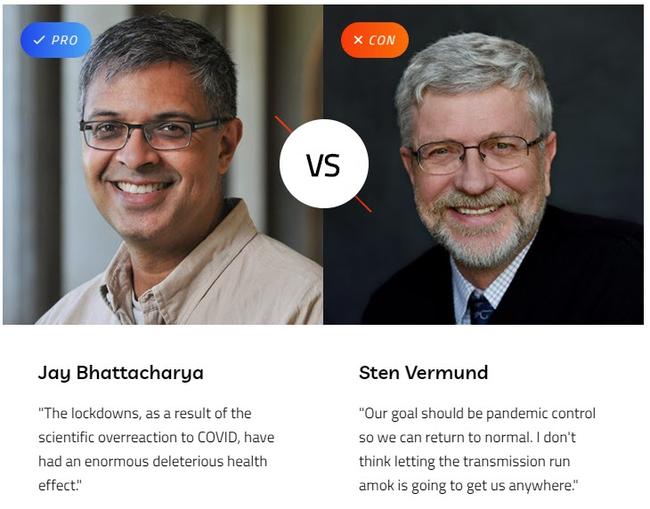Munk Debates: Scientific Community Has Over-Reacted To COVID-19 Threat (& The Data Proves It) Tyler Durden Thu, 09/10/2020 - 22:40
Via MunkDebates.com,
Are we overreacting to COVID-19?
Be it Resolved, the scientific community has overreacted to the threat of COVID-19 and the data prove it...
Six months into a global pandemic and 63,000 scientific papers later, scientists and medical researchers continue to be perplexed by COVID-19. There are many unknowns with the virus, and one of the most controversial is how deadly it really is. Since the beginning of the pandemic, leading health institutions such as the World Health Organization and the National Institute of Allergy and Infectious Diseases have warned that COVID-19 is much more dangerous than the seasonal flu and that, without expansive public health measures, millions of people around the world could die from the virus.
But there are some in the scientific community who disagree. And they say they have the data to prove it. Antibody testing of large population groups indicates that we could be grossly underestimating the number of people who have been infected by the virus – which means we are dramatically overestimating the death rate. Given these findings, they question whether sweeping public health controls are the way to approach a possible second wave of COVID-19 this autumn.
GUESTS
To understand the true prevalence of COVID-19 infections in the United States, Jay Bhattacharya has recently undertaken several seroprevalence studies (the study of antibodies in a population). You can read about his study of Santa Clara County in California here and his study of 5,600 Major League Baseball employees here.
Sten Vermund has published numerous scholarly studies on infectious diseases, which you can view here.
During the debate both Jay and Sten speak about COVID-19’s “infection fatality rate” (IFR). IFR is one of the most important characteristics of an infectious disease in determining its severity. It is basically the ultimate measure of a disease’s ability to cause death. You can learn more about IFR and how it is estimated here. In the debate, both Jay and Sten agree that the current estimates of the COVID-19 infection fatality rates are overestimated and therefore misleading. To learn more, read Jay’s Wall Street Journal op ed.
During the debate, Sten points out that between March and May of 2020 there was a 19 per cent excess death rate in the United States. Excess death rates refer to the difference between the observed numbers of deaths in specific time period and expected number of deaths in the same time period. According to Sten, the excess rates are probably 28 per cent higher than the official deaths tally of COVID-19 because so many cases are not reported. This Nature.com article supports this view.
Jay argues that part of the science community’s overreaction to COVID-19 has been censorship of unpopular scientific views. Jay refers to an op ed in the New York Times by Michael Eisen that expresses concern about how scientific study pre-prints are being released before they are peer reviewed, and calling for the establishment of a scientific “rapid review” service for pre-prints.
One of the scientists Jay identifies as having an unorthodox view on COVID-19 is Gabriela Gomez, She speaks about her research on herd immunity occurring when as little as ten percent of the population has been infected with the virus here and you can read her research article here.
Sten and Jay disagree with each other about the feasibility of isolating the most vulnerable members of society, particularly the elderly, while letting the rest of the population continue to live normally. Sten refers to a New York Times article by David Katz which supports the strategy of “vertical interdiction”, where those over 60 are “preferentially protected.”
Jay refers to the recent release of findings from a Public Health England study that found negligible spread among one million students who returned to school in June.
During the debate Jay identifies Sweden’s approach to COVID-19 as a model for the world, while Sten argues it represents a failed strategy. You can decide for yourself by listening to the Munk Debate, Be it resolved, Sweden is the model for how to fight this pandemic and the next.
Listen to the full debate below:
http://dlvr.it/RgNMNr

No comments:
Post a Comment